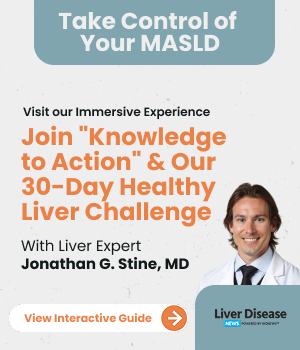Fatty liver disease treatment DD01 gets FDA fast track designation
Phase 2 clinical trial will test therapy in MASH

The U.S. Food and Drug Administration (FDA) has granted fast track designation to DD01 as a potential treatment for a severe manifestation of fatty liver disease known as metabolic dysfunction-associated steatohepatitis (MASH).
Fast track status is designed to speed the development of potentially important therapies for serious conditions with unmet medical needs. It gives DD01’s developer, D&D Pharmatech, access to perks including more frequent meetings with the FDA throughout the drug development process.
DD01 showed promise in adults with metabolic dysfunction-associated fatty liver disease (MAFLD), previously known as non-alcoholic fatty liver disease, in a Phase 1 clinical trial (NCT04812262). D&D is now planning to launch a Phase 2 clinical trial to test the therapy in people with MASH.
“We are pleased with the FDA’s decision to grant fast track designation for DD01 and look forward to initiating a Phase 2 study in biopsy-confirmed MASH patients,” Seulki Lee, PhD, CEO of D&D, said in a company press release.
MASH, formerly known as non-alcoholic steatohepatitis, or NASH, is a severe form of MAFLD in which fat builds up in the liver (steatosis) and drives liver inflammation, which can lead to scarring.
Trial shows therapy controls weight, blood sugar, fatty liver
“MASH has a significant unmet need,” Lee said, noting that recent clinical trials have “proven that efficiently reducing excessive liver fat content leads to ameliorating MASH and liver scarring.”
DD01, administered through subcutaneous (under-the-skin) injections, is designed to reduce the buildup of fat in the liver by activating receptor proteins of glucagon-like peptide-1 (GLP-1) and glucagon.
The therapy was shown to reduce liver fat and scarring, while promoting weight loss and improving control of blood sugar, or glucose, in several animal models of obesity, diabetes, and fatty liver, including non-human primates.
Its effects were greater than those of semaglutide, according to D&D. Semaglutide, sold under brand names including Ozempic and Wegovy, is an approved GLP-1 receptor protein activator for treating type 2 diabetes and obesity. Both these conditions are thought to contribute to MAFLD and MASH.
A U.S.-based Phase 1 study tested DD01 in 107 overweight/obese adults with type 2 diabetes and with or without MAFLD. In the study’s first part, participants without MAFLD were given a single injection of either DD01, at various doses, or a placebo. In the second part, 50 participants with MAFLD were randomly assigned to receive either DD01 at doses up to 80 mg, or a placebo, once weekly for four weeks.
The trial’s goals were to evaluate the therapy’s safety, pharmacokinetics (movement into, through, and out of the body), and pharmacodynamics (effects on the body).
D&D said average liver fat levels decreased by more than 50% in patients receiving once-weekly DD01 at the two higher doses, compared with a drop of less than 5% among those given a placebo. All patients in high-dose group experienced at least a 40% reduction in liver fat after four weeks of treatment.
Treatment with the higher doses of DD01 also led to increased levels of insulin, the hormone controlling blood glucose levels; reduced levels of HbA1c, a marker of blood sugar; and weight loss.
The company said the therapy was generally safe and well tolerated, with reports of gastrointestinal adverse events similar to those seen with selective GLP-1 receptor activators.
“DD01 provides rapid reductions in liver fat and beneficial effects on glucose control,” Lee said. “Thus, we anticipate further studying DD01 in biopsy-confirmed MASH patients after prolonged treatment in an upcoming Phase 2 [trial].”
D&D is also developing DD03, an oral activator of not only GLP-1 and glucagon receptors, but also the gastric inhibitory polypeptide receptor, which is associated with obesity, for treating obesity and MASH.







